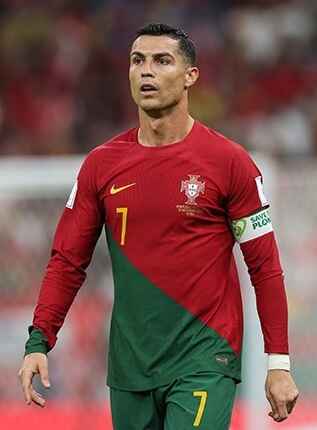
Cristiano Ronaldo, often hailed as one of the greatest footballers of all time, is a name that echoes throughout the world of sports. Born on February 5, 1985, in Funchal, Madeira, Portugal, Ronaldo’s rise from humble beginnings to sporting stardom has been nothing short of remarkable.
*Cristiano Ronaldo Al Nasar, Al Nasar is the name of the Saudi football club of which Ronaldo is a member currently, details at the later section of biography.
From a young age, Ronaldo exhibited a natural talent for the beautiful game, and his passion for football became evident as he joined local clubs and quickly gained recognition for his exceptional skills on the field. His journey to success was accelerated when he caught the eye of Manchester United’s scouts, leading to his signing with the English club in 2003.
During his tenure with Manchester United, Ronaldo’s talent flourished under the guidance of legendary manager Sir Alex Ferguson. His blistering pace, mesmerizing dribbling ability, and impeccable goal-scoring instincts made him a formidable force on the pitch. Ronaldo’s impressive performances earned him numerous accolades, including three Premier League titles and the prestigious Ballon d’Or.
In 2009, Cristiano Ronaldo embarked on a new chapter in his career, transferring to Real Madrid in what was then a world-record transfer fee. At the Spanish capital, he continued to rewrite footballing history, breaking records and forming a fierce rivalry with another football icon, Lionel Messi. With Real Madrid, Ronaldo won four Champions League titles and became the club’s all-time leading scorer.
His thirst for new challenges led him to Juventus in 2018, where he showcased his enduring brilliance on the field, winning Serie A titles and captivating fans worldwide. Beyond his on-pitch exploits, Ronaldo’s philanthropy and charitable endeavours have also left a lasting impact, making him an inspiration both on and off the field.
Cristiano Ronaldo’s story is one of passion, determination, and sheer talent, proving that dreams can be achieved through hard work and dedication. In this biography, we delve into the life of this footballing legend, unravelling the moments that shaped him into the global icon he is today.
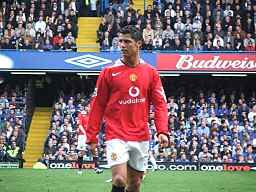
Exploring the Early Years and Humble Beginnings
Cristiano Ronaldo, growing up in the nearby parish of Santo António, he was the youngest of four children born to Maria Dolores dos Santos Viveiros da Aveiro, a cook, and José Dinis Aveiro, a municipal gardener and part-time kit man. Ronaldo’s roots extended to the island of São Vicente, Cape Verde, through his great-grandmother on his father’s side.
Named after actor and former U.S. President Ronald Reagan, Cristiano faced adversity even before birth. His mother contemplated aborting him due to their impoverished circumstances, his father’s struggle with alcoholism, and the family’s financial strain from having too many children. However, the doctor refused to perform the procedure, as abortions were illegal in Portugal at the time. Consequently, Ronaldo was raised in a humble Catholic Christian household, sharing a room with his siblings.
During his early years, Ronaldo began his football journey at Andorinha, where his father served as the kit man. Subsequently, he joined Nacional before catching the attention of Sporting CP during a three-day trial at the age of 12. The club signed him for a modest fee, and he moved from Madeira to Alcochete, near Lisbon, to join Sporting’s youth academy.
By the age of 14, Ronaldo was convinced of his potential to play football semi-professionally, and with his mother’s agreement, he left formal education to dedicate himself entirely to the sport. Despite popularity among his peers, Ronaldo faced challenges at school and was eventually expelled for an incident where he threw a chair at his teacher. At one point, he encountered a health scare when diagnosed with tachycardia, a condition that could have jeopardized his football career. However, Ronaldo underwent successful heart surgery and quickly returned to training, determined to pursue his passion for the game.
Ronaldo’s Journey in Club Football
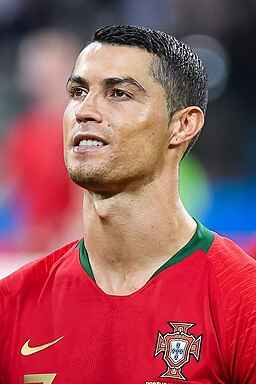
Sporting CP
At the age of 16, Cristiano Ronaldo earned a promotion from Sporting CP‘s youth team to the first-team squad, catching the attention of manager László Bölöni with his impressive dribbling skills. In a remarkable display of talent, Ronaldo achieved a series of unprecedented milestones within a single season, becoming the first player to represent the club at various levels, including the under-16, under-17, under-18, B team, and the senior first team.
His official debut in the Primeira Liga came on 29th September 2002, in a match against Braga, and just a few days later, on 7th October, he showcased his scoring prowess by netting two goals in a 3-0 victory against Moreirense. During the 2002-2003 season, Ronaldo’s stellar performances attracted the attention of several top clubs. Liverpool‘s manager, Gérard Houllier, and Barcelona‘s president, Joan Laporta, were among those considering the young talent. Arsenal‘s manager, Arsène Wenger, even met Ronaldo to discuss a potential transfer.
However, it was Manchester United‘s Alex Ferguson who was most determined to secure Ronaldo’s services on a permanent basis. After experiencing Ronaldo’s talents firsthand during a 3-1 defeat to Sporting in August 2003, Ferguson was convinced of the player’s potential and urgently sought to sign him. Initially, United planned to sign Ronaldo and loan him back to Sporting for a year, but Ferguson’s admiration for the young star led to an immediate purchase. Sporting CP received £12.24 million for the transfer; a move Ferguson considered acquiring “one of the most exciting young players” he had ever seen.
Sporting CP showed their appreciation for Ronaldo’s contributions by honouring him years later in April 2013, selecting him as their 100,000th member, a testament to the impact he had made during his time at the club.
Manchester United
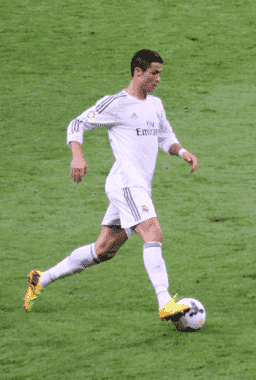
Ronaldo’s arrival at Manchester United was finalized on 12th August 2003, which unfortunately meant he missed the chance to participate in the 2003 FA Community Shield. However, he made it in time for the opening fixture of the 2003-2004 season against Bolton Wanderers, becoming the first Portuguese player to join the prestigious club. His transfer fee at that time set a record for being the most expensive teenage signing in English football history. Although Ronaldo initially requested the number 28 jersey, which he wore at Sporting, he was assigned the iconic squad number 7 shirt, previously donned by legendary United players like George Best, Eric Cantona, and David Beckham. This change further fuelled Ronaldo’s determination and ambition.
During his tenure in England, Ronaldo’s development was significantly influenced by the guidance of manager Sir Alex Ferguson, whom he regarded as a father figure in his sporting career. Ronaldo expressed immense gratitude towards Ferguson, acknowledging him as one of the most crucial and influential factors in shaping his successful journey.
On 16th August 2003, Cristiano Ronaldo made his debut for Manchester United as a substitute in a commanding 4-0 victory against Bolton Wanderers in the Premier League. The moment he stepped on the field to replace Nicky Butt, he received a standing ovation, showcasing the anticipation and excitement surrounding his arrival. His performance during the match earned widespread acclaim, with football legend George Best hailing it as the most thrilling debut he had ever witnessed.
Ronaldo’s first goal for Manchester United came through a brilliant free-kick during a 3-0 triumph over Portsmouth on 1st November. As the season progressed, he added three more league goals to his tally. However, on the final day of the season, while playing against Aston Villa, Ronaldo experienced his first red card, a blemish on an otherwise remarkable campaign.
Concluding his debut season in English football on a high note, Ronaldo played a crucial role in Manchester United‘s 3-0 victory over Millwall in the 2004 FA Cup Final, securing his first trophy with the club. BBC pundit Alan Hansen identified him as the standout star of the final, highlighting his significant impact on the team’s success.
While Ronaldo’s skills on the pitch were admired by many, the British press criticized his use of “elaborate” step-overs while attempting to outplay opponents. However, teammate Gary Neville staunchly defended him, asserting that Ronaldo was not just a flashy performer but a genuinely talented player with the potential to become a world-class footballer.
On 29th October 2004, Ronaldo made a significant mark in Manchester United‘s history by scoring their 1,000th Premier League goal, although the team faced a disappointing 4-1 loss to Middlesbrough. Shortly after, he extended his contract with the club, adding two more years, securing his stay until 2010.
In the early stages of the 2004-2005 season, Ronaldo showcased his brilliance in two standout matches, delivering a goal and an assist against Aston Villa and scoring twice against fierce rivals Arsenal. He played the entire 120 minutes in the 2005 FA Cup Final against Arsenal, which ended in a goalless draw, and although he converted his attempt during the penalty shoot-out, Manchester United narrowly lost 5-4. Nevertheless, Ronaldo still claimed his second trophy in English football, the Football League Cup, contributing with a goal in United’s 4-0 final victory over Wigan Athletic.
During his third season in England, Ronaldo faced some controversies and challenges. He received a one-match ban from UEFA for a gesture towards Benfica fans and was sent off in the Manchester derby for kicking Manchester City‘s Andy Cole. Additionally, he had a disagreement with teammate Ruud van Nistelrooy, who disapproved of Ronaldo’s showboating style of play. After the 2006 FIFA World Cup, where an incident involving his club teammate Wayne Rooney resulted in Rooney’s sending off, Ronaldo publicly expressed his desire for a transfer, feeling unsupported by the club. However, Manchester United refused to entertain the possibility of his departure.
Despite facing boos throughout the 2006-2007 season due to the World Cup incident with Rooney, this season marked Ronaldo’s breakthrough. Under the guidance of first-team coach René Meulensteen, he learned to be more unpredictable, improved his teamwork, and capitalized on scoring opportunities, leading to his first-ever Premier League title and surpassing the 20-goal mark. Ronaldo’s outstanding performances earned him the Premier League Player of the Month honours for November and December, becoming only the third player to receive consecutive awards.
Triumphs in Team and Personal Achievement
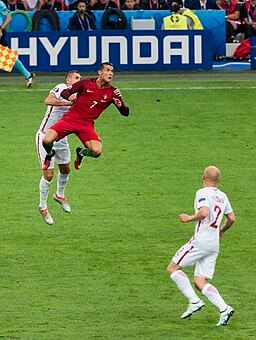
During the 2006-2007 UEFA Champions League quarter-final, Cristiano Ronaldo finally scored his first goals in the competition after 30 matches. He netted twice in a remarkable 7-1 victory over Roma. In the subsequent semi-final first leg against Milan, Ronaldo found the back of the net just four minutes into the match, leading Manchester United to a thrilling 3-2 win. However, in the second leg, he faced tough marking and United suffered a 3-0 defeat at the San Siro. Ronaldo’s contributions helped Manchester United secure a spot in the 2007 FA Cup Final, but they faced a 1-0 defeat against Chelsea in the final match.
His outstanding performances during the season garnered a plethora of personal awards. Ronaldo received accolades from the Professional Footballers’ Association (PFA), including Player’s Player, Fans’ Player, and Young Player of the Year awards, as well as the Football Writers’ Association‘s Footballer of the Year award. His exceptional achievements made him the first player ever to win all four main PFA and FWA honours. Consequently, his wages were increased to £120,000 per week as part of a five-year contract extension. While Ronaldo finished as the runner-up to Kaka for the 2007 Ballon d’Or, he secured third place, following Kaka and Lionel Messi, in the race for the 2007 FIFA World Player of the Year award.
On 12th January 2008, Ronaldo achieved another milestone by scoring his first hat-trick for Manchester United during a dominant 6-0 victory against Newcastle United, elevating his team to the top of the league table. He went on to captain the team for the first time in a home win over Bolton on 19th March, where he scored both goals in a 2-0 victory. Ronaldo’s second goal marked his 33rd of the campaign, surpassing George Best’s record of 32 goals in the 1967-68 season, setting a new single-season record for a midfielder at the club. His 31 league goals earned him the Premier League Golden Boot and the European Golden Shoe, making him the first winger to receive the latter award. Additionally, Ronaldo was honoured with the PFA Players’ Player of the Year and FWA Footballer of the Year awards for the second consecutive season.
In the Champions League knockout stage, Ronaldo proved pivotal in Manchester United’s success. He scored the decisive goal against Lyon, helping the team advance to the quarter-finals with a 2-1 aggregate victory. Playing as a striker, he scored with a header in the 3-0 aggregate win over Roma. This performance took Manchester United to the final against Chelsea in Moscow on 21st May. Despite his opening goal being cancelled out and missing a penalty kick in the shoot-out, United emerged triumphant with a 6-5 penalty victory. Ronaldo’s incredible scoring prowess in the Champions League earned him the title of the top scorer and the prestigious UEFA Club Footballer of the Year award.
Throughout the 2007-08 season, Ronaldo displayed his goal-scoring brilliance and achieved a total of 42 goals in all competitions, marking his most prolific campaign during his time in England. He faced a suspension of three matches after headbutting a Portsmouth player at the beginning of the season, a learning experience that taught him not to let opponents provoke him. Amid rumours of a potential move to Real Madrid, Manchester United filed a complaint with FIFA over Madrid’s alleged pursuit of the player. Despite the controversy, Ronaldo remained committed to Manchester United for another year.
Ballon d’Or Triumph and Ongoing Achievements
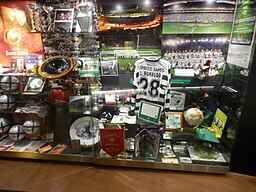
Before the 2008-2009 season began, on 7th July, Cristiano Ronaldo underwent ankle surgery, sidelining him for 10 weeks. Upon his return, he showcased his scoring prowess by netting his 100th goal in all competitions for Manchester United, scoring two free kicks in a convincing 5-0 victory against Stoke City on 15th November. This achievement marked the moment he had scored against all 19 opposition teams in the Premier League at that time.
At the end of 2008, Ronaldo played a crucial role in Manchester United’s triumph in the 2008 FIFA Club World Cup in Japan, assisting in the final-winning goal against Liga de Quito and earning the Silver Ball in the process. His remarkable performances and accolades continued, as he received both the 2008 Ballon d’Or and the 2008 FIFA World Player of the Year awards, making him the first Ballon d’Or winner from Manchester United since George Best in 1968 and the first Premier League player to be named FIFA World Player of the Year.
During the season, Ronaldo’s memorable 40-yard strike in the second leg against Porto secured him the inaugural FIFA Puskás Award, recognizing it as the best goal of the year. Despite his individual brilliance, Manchester United suffered a 2-0 defeat to Barcelona in the final in Rome, limiting Ronaldo’s impact. However, he left England with an impressive collection of nine trophies, including Manchester United‘s third successive league title and a Football League Cup.
Throughout the campaign, Ronaldo scored a total of 26 goals in all competitions, a slight dip of 16 goals compared to the previous season but in four more appearances. His final goal for Manchester United came on 10th May 2009, as he expertly converted a free-kick during the Manchester derby at Old Trafford.
Real Madrid
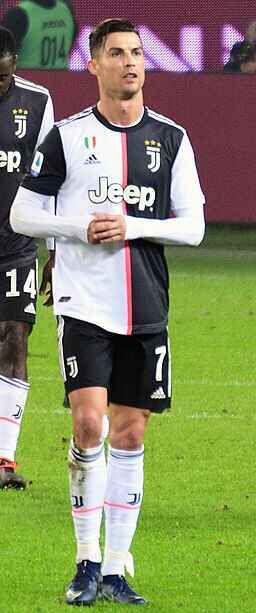
In 2009, Cristiano Ronaldo joined Real Madrid for a world-record transfer fee of £80 million (€94 million). His contract, valid until 2015, had an annual worth of €11 million and included a staggering €1 billion buy-out clause. Ronaldo’s arrival at Real Madrid garnered immense attention, with over 80,000 fans attending his presentation at the Santiago Bernabéu, surpassing a 25-year-old record set by Diego Maradona at Napoli. Due to captain Raúl already wearing the number 7, Ronaldo received the number 9 shirt from former Madrid player Alfredo Di Stefano.
In his first season in La Liga, Ronaldo made a significant impact, scoring a penalty in his debut against Deportivo La Corunna and scoring in each of his first four league games, becoming the first Madrid player to achieve this feat. He also scored his first Champions League goals for the club with two impressive free kicks in the first group match against Zürich. However, his strong start was interrupted by an ankle injury suffered on international duty, keeping him out for seven weeks. Ronaldo returned to action and received his first red card in Spain during a match against Almería. Despite his exceptional performances, he finished second in the 2009 Ballon d’Or and 2009 FIFA World Player of the Year awards, trailing behind Lionel Messi. Ronaldo ended the season with 33 goals in all competitions, helping Real Madrid accumulate a record 96 points in the league, but the team did not secure a trophy that season.
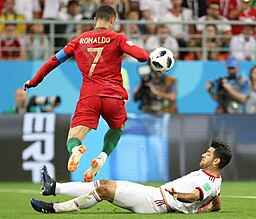
Ahead of the 2010-2011 season, Ronaldo was given the number 7 shirt after Raúl’s departure. He regained his Ballon d’Or-winning form, delivering a remarkable four-goal performance in a 6-1 victory against Racing Santander. Throughout the season, he scored several hat-tricks against various opponents. Despite his remarkable achievements, he did not make it to the top three in the inaugural 2010 FIFA Ballon d’Or. During a series of Classicos against Barcelona, Ronaldo scored twice, equalling his personal record of 42 goals in all competitions. He went on to win his first trophy in Spain, the 2011 Copa del Rey Final, with a match-winning goal in the 103rd minute. Ronaldo concluded the season by becoming the first player in La Liga history to score 40 goals. Additionally, he won the European Golden Shoe for a second time, an unprecedented achievement in different leagues.
In the 2015-2016 season, Cristiano Ronaldo achieved significant milestones at Real Madrid. At the beginning of his seventh season with the club, he became their all-time leading scorer, both in the league and in all competitions. A remarkable five-goal performance during a 6-0 victory over Espanyol on 12th September elevated his La Liga goal tally to 230 goals in just 203 games, surpassing the previous record held by Raúl. In the following month, on 17th October, he surpassed Raúl again by scoring his 324th goal for the club in a 3-0 win against Levante at the Bernabéu.
Furthermore, Ronaldo made history by becoming the all-time leading scorer in the Champions League. His hat-trick in the first group match against Shakhtar Donetsk took his total to 80 goals, breaking the previous record shared with Lionel Messi at 77 goals. Additionally, Ronaldo achieved another significant milestone by reaching 500 career goals for both club and country during a match against Malmö FF on 30th September, where he scored two goals in a 2-0 away win.
Ronaldo’s scoring prowess continued throughout the Champions’ League group stage, making him the first player to score double figures with a record of 11 goals, including another four-goal haul against Malmö. These achievements further solidified Ronaldo’s status as one of the greatest goal scorers in football history.
Juventus
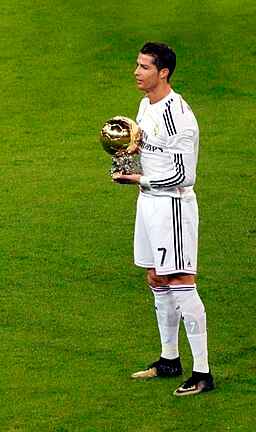
After extensive negotiations for a new contract with Real Madrid, Cristiano Ronaldo surprised the football world by signing a four-year deal with the Italian club Juventus on 10th July 2018. The transfer amounted to €100 million, with an additional €12 million covering other fees and contributions to Ronaldo’s youth clubs. This record-breaking transfer made Ronaldo the highest-paid player above the age of 30 and marked the highest transfer fee ever paid by an Italian club.
Ronaldo’s decision to leave Real Madrid was influenced by his desire for a fresh challenge in his career. He expressed the need to take on new opportunities as his reason for departing the Spanish club. However, he also later stated that his transfer was partly influenced by a perceived lack of support from Real Madrid’s club president, Florentino Pérez.
Scoring Century for Juventus, Top Scorer Title, and Departure
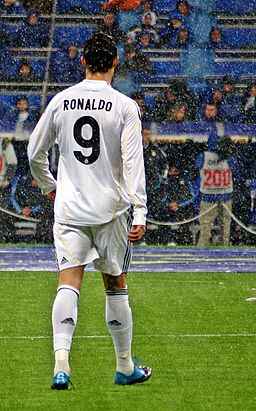
On 20th September 2020, Ronaldo scored in Juventus‘ first league match of the season, a 3-0 victory over Sampdoria at home. After recovering from COVID-19, he made a strong return on 1st November against Spezia, coming off the bench to score two goals, including one from a penalty, during a 4-1 away win. In a Champions League group stage match against Dynamo Kyiv on 2nd December, he reached a significant milestone by scoring his 750th senior career goal.
Throughout his time at Juventus, Ronaldo achieved several notable records. He played his 100th match for the club on 13th December, scoring two penalties in a 3-1 away win over Genoa, bringing his goal tally to 79. Ronaldo also scored crucial goals in key matches, such as the opening goal in Juventus’ 2-0 victory against Napoli in the 2020 Supercoppa Italiana on 20th January 2021. He further solidified his status as a football legend by becoming the first player to score at least 20 goals in 12 consecutive seasons in the top five European leagues during a 3-0 win over Spezia on 2nd March. Ronaldo also scored his 57th career hat-trick in a 3-1 away win over Cagliari on 14th March.
On 12th May, Ronaldo reached a significant milestone by scoring his 100th goal for Juventus in all competitions on his 131st appearance, becoming the fastest player to achieve this feat in the club’s history. He continued to make history with Juventus by winning the 2021 Coppa Italia Final on 19th May, becoming the first player to win all major domestic trophies in England, Spain, and Italy. Ronaldo finished the season with 29 league goals, winning the Capocannoniere award for the highest goal scorer and becoming the first player to achieve this feat in the English, Spanish, and Italian leagues.
However, Ronaldo’s future at Juventus became uncertain during the new season. He started the first match of the season as a substitute and scored a goal that was later ruled out by VAR. Amid reports of his potential departure, Ronaldo confirmed to manager Massimiliano Allegri that he had no intention of staying with Juventus. While there were negotiations with Manchester City, the deal fell through due to cost concerns, and on the same day, Manchester United, Ronaldo’s former club, emerged as the front runners in the race to sign him. Former manager Alex Ferguson and several ex-teammates played a role in persuading Ronaldo to rejoin Manchester United.
Homecoming to Manchester United
On 27th August 2021, Manchester United made an official announcement that they had come to an agreement with Juventus to re-sign Cristiano Ronaldo, pending the finalization of personal terms, visa, and medical examination. The transfer involved an initial fee of £12.85 million, and Ronaldo signed a two-year contract with an option for an additional year. The confirmation of the transfer took place on 31st August.
Upon his return to Manchester United, Ronaldo was granted the iconic number 7 shirt, which became available after Edinson Cavani agreed to switch to number 21. The demand for Ronaldo’s new jersey was unprecedented, breaking the all-time record for shirt sales following a transfer, surpassing the previous record set by Lionel Messi after his move to Paris Saint-Germain.
By the end of the season, he had scored a total of 24 goals across all competitions, with 18 of them in the Premier League, securing him the third position on the league’s top goal scorers list, just behind the Golden Boot winners Mohamed Salah and Son Heung-min. Ronaldo’s outstanding performance earned him a spot in the Premier League Team of the Year and the prestigious Sir Matt Busby Player of the Year award, an honour given to Manchester United‘s best player of the season. Despite these individual achievements, the season proved disappointing for the team, as they finished in sixth place in the league and only qualified for the UEFA Europa League, leaving Ronaldo without any trophies for the first time since 2010.
Concluding Season and Farewell
Facing increasing discontent regarding United’s trajectory both on and off the field, Ronaldo was absent from the club’s preseason tour of Thailand and Australia, citing family matters. This occurred amidst speculations of his intent to transition to a club participating in the Champions League, despite the insistence of incoming manager Erik ten Hag that Ronaldo was not on the market and was integral to the club’s future strategies. Ronaldo’s agent, Jorge Mendes, started discussions with numerous clubs about a loan or free transfer. Among those considered were Bayern Munich, Paris Saint-Germain, and Chelsea, with the last club’s fresh owner, Todd Boehly, expressing particular interest in the potential transfer. Nonetheless, due to Ronaldo’s age, the projected total cost of the transfer, and his high salary requirements, several European clubs, including Chelsea after their manager Thomas Tuchel disapproved the acquisition, declined the chance to secure him.
Ronaldo couldn’t move to a new team and as a result, he got benched and replaced by Marcus Rashford and Anthony Martial. He was only playing in Europa League games. He managed to score his first goal in this tournament when he was 37 years old, in a game against Sheriff Tiraspol. Later, when United played against Manchester City and lost, Ronaldo didn’t even play. The coach said it was out of respect for his successful career. He did score his 700th career goal as a substitute in a game against Everton.
However, in a match against Tottenham, Ronaldo was unhappy about being a substitute again and left early. As a punishment, the coach didn’t let him play the next game and made him practice alone. After a talk with the coach, he got back into the team and scored another goal in a game against Sheriff, helping United get to the next round of the Europa League. He was even made the team captain for a game against Aston Villa. But he missed the games before the World Cup break because the coach said he was sick.
On November 14, Ronaldo gave an interview to Piers Morgan. In it, he said he felt “let down” by his coach and club leaders who wanted him to leave. He claimed they didn’t believe him when he said his daughter was sick, which is why he missed the pre-season games. Because of this, he said he didn’t respect the coach. He also said he was unhappy about how the club communicated with him.
He believed the coach purposely upset him by making him sit on the bench during the Manchester City game and then tried to get him to play in the last minutes of the Tottenham game. But he said he was sorry for leaving early.
Ronaldo also questioned why Rangnick was appointed the previous season since he was more of a sports director, not a coach. He also felt the club hadn’t improved since the former manager, Alex Ferguson, left in 2013, even though he had hoped for improvements in technology and facilities.
He stated that the Glazer family, the owners of the club, “didn’t care about the club” because he never talked to them. He described United as a “marketing club”. After this interview, the club started to look into whether Ronaldo had broken his contract and they thought about ending his contract. On November 22, his contract was ended, which both parties agreed to. Another interesting fact is that there always has been comparison between Cristiano Ronaldo and Lionel Messi.
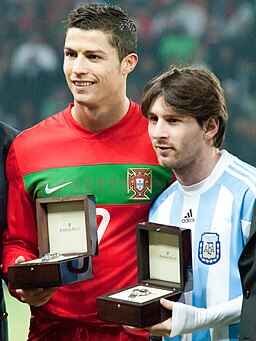
*Cristiano Ronaldo’s Unprecedented Journey to Al-Nassr: An Exemplar in Modern Football
In the dynamic world of football, no journey has ever been as intriguing as Cristiano Ronaldo’s move to Al-Nassr. His decision was met with worldwide attention, not only due to his stature but also the major shift it represented in the global football landscape.
It was a summer day like any other, football fans worldwide were engrossed in transfer rumors. Then, out of the blue, came the announcement that changed everything: Cristiano Ronaldo, the five-time Ballon d’Or winner, was moving to Al-Nassr. His decision was more than just a transfer; it was a statement of intent, a new chapter, and a challenge to convention.
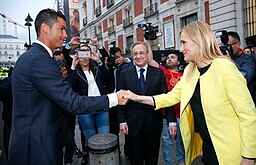
Before we delve into the specifics of Ronaldo’s move to Al-Nassr, let’s briefly look at his illustrious career. He has won countless accolades and achieved numerous records, from his days at Manchester United to his tenure at Real Madrid, followed by Juventus. He’s considered one of the greatest players in football history.
Why Al-Nassr? The question lingered on every football enthusiast’s mind. The answer lies in the new challenges, opportunities, and the promise of contributing to a growing league that attracted Ronaldo. His move to Al-Nassr is seen as a significant boost for Saudi Arabian football, raising its global profile.
Ronaldo’s arrival at Al-Nassr was not a random choice. This club has steadily risen in the Asian football ranks, with its growing influence evident in both local and international scenes. His addition to the team underscores Al-Nassr‘s ambition to become a dominant force in Asian football.
Ronaldo’s presence in Al-Nassr has been electrifying. His influence extends beyond the pitch, driving ticket sales, increasing global attention, and creating a newfound respect for Saudi Arabian football. Ronaldo’s decision has inspired other high-profile players to consider playing in the Saudi Pro League, further enhancing its reputation.
Ronaldo’s move to Al-Nassr is about more than just football; it’s about cultural exchange. His presence in Saudi Arabia is fostering an appreciation for the country’s rich heritage. Simultaneously, Ronaldo brings with him the football culture of Europe, creating a beautiful blend of traditions.
While it’s too early to predict the long-term impact of Ronaldo’s move, it’s clear that his presence has already made an indelible mark on Al-Nassr and Saudi Arabian football. With his commitment and unparalleled skill set, Ronaldo’s future at Al-Nassr looks promising.
Cristiano Ronaldo’s move to Al-Nassr represents a fascinating turn in the annals of football. It is a testament to his adventurous spirit and unyielding quest for new challenges. His presence is a game-changer, elevating the status of Al-Nassr and the Saudi Pro League on a global scale. It’s a chapter in modern football that will be talked about for generations.
International Career
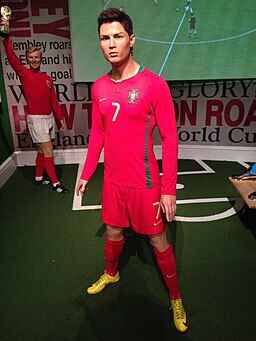
Cristiano Ronaldo has a look alike wax statue at Madam Tussaud’s London. Ronaldo had an amazing career playing for Portugal. He started playing for the national team when he was 18 years old in 2003. Since then, he has played 200 games for Portugal, which is more than anyone else. He has scored 123 goals for Portugal, making him the all-time leading scorer.
Ronaldo has played in eleven big tournaments like the European Championships and the FIFA World Cups. He helped Portugal win the 2016 European Championship by scoring three goals. He is the only player to score in all six major UEFA tournaments.
In international football, Ronaldo has won the European Championship, the UEFA Nations League, and the FIFA Club World Cup. He has also won the prestigious Ballon d’Or award five times, which is the most for any European player.
Ronaldo is considered one of the greatest players ever. He is known for scoring a lot of goals, being a skilled playmaker, and a leader on the field. He is famous all around the world, and his popularity has made football a very popular sport.
Some of Ronaldo’s individual achievements in international football include being the top scorer in the UEFA European Championship and its qualification matches, the FIFA Club World Cup, and having the most international goals and appearances. He has also won five Ballon d’Or awards.
Ronaldo played for Portugal in the 2022 FIFA World Cup, his fifth World Cup. In the opening match against Ghana, he scored a penalty kick and made history by being the first male player to score in five different World Cups. In another match, he faced criticism from his coach for his reaction when being substituted. He was not in the starting lineup for Portugal‘s last 16 match against Switzerland, which was the first time he didn’t start a major tournament game for Portugal since Euro 2008. Despite this, he came off the bench in that match and helped Portugal win 6–1. In the quarter-finals against Morocco, he again came off the bench and reached a milestone by equalling the record for the most international appearances. Unfortunately, Portugal lost that match 1–0.
After the World Cup, there were doubts about Ronaldo’s future with the national team due to rumours of a possible omission by the new manager. However, he was still named in Portugal’s squad for the UEFA Euro 2024 qualifiers. In one of the matches, he scored two goals, and with his 197th appearance, he became the male footballer with the most caps in history. Later, in another Euro qualifier match, he made his 200th appearance for Portugal and scored the winning goal, becoming the first player in men’s international football to achieve 200 appearances for his country.
Even though he is still playing, Ronaldo will continue to strive for more accomplishments in the future.
Ronaldo’s life other than as a footballer
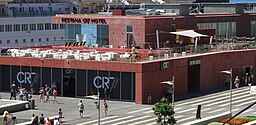
Besides his football career, Ronaldo is a successful businessman with his own line of clothing, shoes, fragrances, and a hotel chain.
Cristiano Ronaldo has an array of business interests that he will engage in after his football career ends. He has followed in the footsteps of footballers like David Beckham by collaborating with various industry leaders.
Recently, Ronaldo has ventured into the hospitality sector, launching several hotels in 2017.
Ronaldo’s hotel chain is named Pestana CR7, a collaboration between Ronaldo and Pestana, a top hotel group from his home country, Portugal. The hotel’s name combines the Pestana brand and Ronaldo’s brand, CR7.
Before his investment in the hospitality industry, Ronaldo launched a lifestyle product line under the CR7 brand, including underwear and fragrances. His hotels extend this brand, marketing themselves as ‘Lifestyle Hotels.’
Currently, Ronaldo’s hotel chain, Pestana CR7, has two locations open: one in Lisbon and the other in Funchal, Madeira, Ronaldo’s birthplace.
Moreover, he is a dedicated philanthropist, supporting charities like Save the Children, UNICEF, and World Vision, and having established the Cristiano Ronaldo Foundation to aid children in need.
Ronaldo’s widespread influence is evident through his massive social media following and immense popularity as a global icon. He serves as a role model for countless young people worldwide, inspiring them with his achievements on and off the field. Additionally, Ronaldo’s life outside of football is equally noteworthy, as he appears as a fashion icon on the covers of prestigious magazines like Vogue and GQ. His multifaceted nature as a successful businessman, philanthropist, role model, and legendary footballer makes him a complex and fascinating figure, rightly considered one of the greatest players of all time.
Thanks for reading this biography, friends. I am sure you must have enjoyed reading about your favorite football star.
Image credits to wikipedia:
https://en.wikipedia.org/wiki/Cristiano_Ronaldo#/media/File:Cristiano_Ronaldo_2018.jpg
https://en.wikipedia.org/wiki/Cristiano_Ronaldo#/media/File:CR_derbi_2013_cropped.png
https://en.wikipedia.org/wiki/Cristiano_Ronaldo#/media/File:1_cristiano_ronaldo_2016.jpg
https://en.wikipedia.org/wiki/Cristiano_Ronaldo#/media/File:C.Ronaldo_at_Museum_Mundo_Sporting.JPG
https://en.wikipedia.org/wiki/Cristiano_Ronaldo#/media/File:CR7_2_11_2019.jpg
https://en.wikipedia.org/wiki/Cristiano_Ronaldo#/media/File:Cristiano_Ronaldo_Madrid.jpg
information sourced from: https://en.wikipedia.org/wiki/Cristiano_Ronaldo#
